Boyle J.A. The Cambridge History of Iran, Volume 5: The Saljuq and Mongol Periods
Подождите немного. Документ загружается.

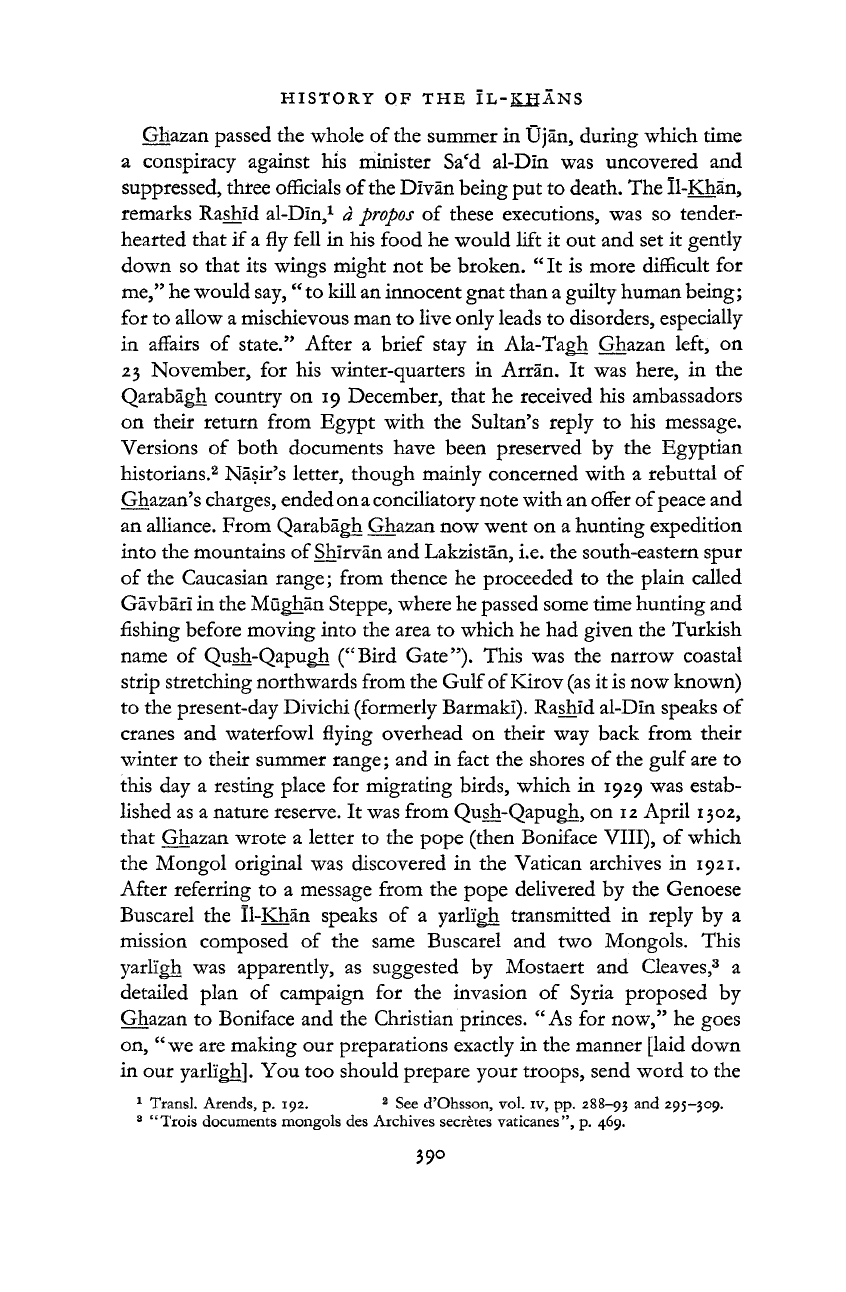
HISTORY OF THE IL-KHANS
390
Ghazan passed the whole of the summer in tJjan, during which time
a conspiracy against his minister Sa
c
d al-Din was uncovered and
suppressed, three officials of the Divan being put to death. The ll-Khan,
remarks Rashid al-Din,
1
a propos of these executions, was so tender-
hearted that if a fly fell in his food he would lift it out and set it gently
down so that its wings might not be broken. "It is more difficult for
me,"
he would say, " to kill an innocent gnat than a guilty human being;
for to allow a mischievous man to live only leads to disorders, especially
in affairs of state." After a brief stay in Ala-Tagh Ghazan left, on
23
November, for his winter-quarters in Arran. It was here, in the
Qaraba
gh country on 19 December, that he received his ambassadors
on their return from Egypt with the Sultan's reply to his message.
Versions of both documents have been preserved by the Egyptian
historians.
2
Nasir's letter, though mainly concerned with a rebuttal of
Ghazan's charges, ended on a conciliatory note with an offer of peace and
an alliance. From Qarabagh Ghazan now went on a hunting expedition
into the mountains of Shirvan and Lakzistan, i.e. the south-eastern spur
of the Caucasian range; from thence he proceeded to the plain called
Gavbari in the Mughan Steppe, where he passed some time hunting and
fishing before moving into the area to which he had given the Turkish
name of Qush-Qapugh
("Bird
Gate"). This was the narrow coastal
strip stretching northwards from the Gulf of Kirov (as it is now known)
to the present-day Divichi (formerly Barmaki). Rashid al-Din speaks of
cranes and waterfowl flying overhead on their way back from their
winter to their summer range; and in fact the shores of the gulf are to
this day a resting place for migrating birds, which in
1929
was estab-
lished as a nature reserve. It was from Qush-Qapugh, on
12
April
1302,
that Ghazan wrote a letter to the pope (then Boniface VIII), of which
the Mongol original was discovered in the Vatican archives in
1921.
After referring to a message from the pope delivered by the Genoese
Buscarel the Il-Khan speaks of a yarligh transmitted in reply by a
mission composed of the same Buscarel and two Mongols. This
yarligh was apparently, as suggested by Mostaert and Cleaves,
3
a
detailed plan of campaign for the invasion of Syria proposed by
Ghazan to Boniface and the Christian princes. "As for now," he goes
on,
" we are making our preparations exactly in the manner [laid down
in our yarligh]. You too should prepare your troops, send word to the
1
Transl. Arends, p. 192.
2
See d'Ohsson, vol. iv, pp. 288-93 and 295-309.
3
"Trois documents mongols des Archives secretes vaticanes", p. 469.
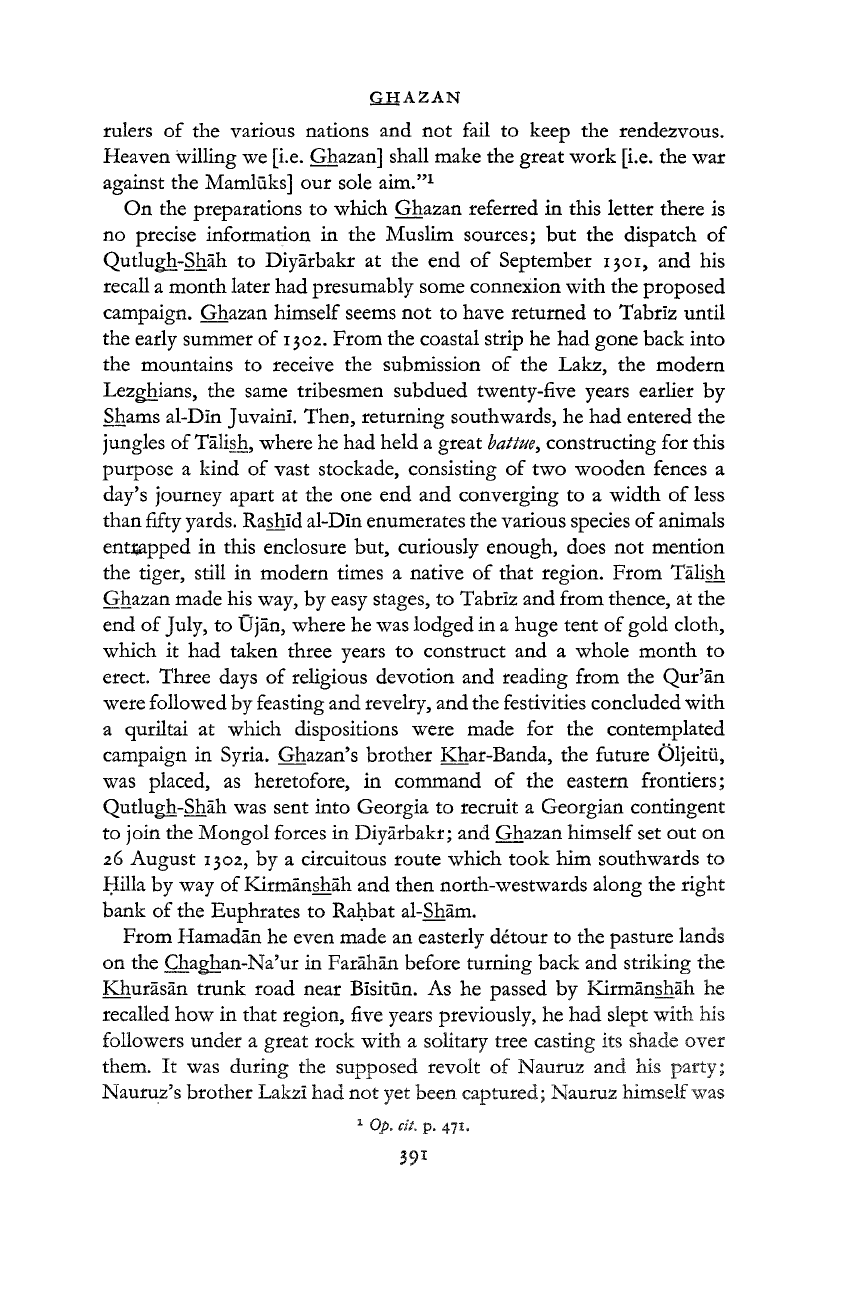
&HAZAN
39I
rulers of the various nations and not fail to keep the rendezvous.
Heaven willing we [i.e. Ghazan] shall make the great work [i.e. the war
against the Mamluks] our sole aim."
1
On the preparations to which Ghazan referred in this letter there is
no precise information in the Muslim sources; but the dispatch of
Qutlugh-Shah to Diyarbakr at the end of September
1301,
and his
recall a month later had presumably some connexion with the proposed
campaign. Ghazan himself seems not to have returned to Tabriz until
the early summer of
1302.
From the coastal strip he had gone back into
the mountains to receive the submission of the Lakz, the modern
Lezghians, the same tribesmen subdued twenty-five years earlier by
Shams al-Din Juvaini. Then, returning southwards, he had entered the
jungles of Talish, where he had held a great
battue,
constructing for this
purpose a kind of vast stockade, consisting of two wooden fences a
day's journey apart at the one end and converging to a width of less
than fifty yards. Rashid al-Din enumerates the various species of animals
entrapped in this enclosure but, curiously enough, does not mention
the tiger, still in modern times a native of that region. From Talish
Ghazan made his way, by easy stages, to Tabriz and from thence, at the
end of July, to Ujan, where he was lodged in a huge tent of gold cloth,
which it had taken three years to construct and a whole month to
erect. Three days of religious devotion and reading from the Qur'an
were followed by feasting and revelry, and the festivities concluded with
a quriltai at which dispositions were made for the contemplated
campaign in Syria. Ghazan's brother Khar-Banda, the future Oljeitu,
was placed, as heretofore, in command of the eastern frontiers;
Qutlugh-Shah was sent into Georgia to recruit a Georgian contingent
to join the Mongol forces in Diyarbakr; and Ghazan himself set out on
26
August
1302,
by a circuitous route which took him southwards to
Hilla by way of Kirmanshah and then north-westwards along the right
bank of the Euphrates to Rahbat al-Sham,
From Hamadan he even made an easterly detour to the pasture lands
on the Chaghan-Na'ur in Farahan before turning back and striking the
Khurasan trunk road near Bisitun. As he passed by Kirmanshah he
recalled how in that region, five years previously, he had slept with his
followers under a great rock with a solitary tree casting its shade over
them. It was during the supposed revolt of Nauruz and his party;
Nauruz's brother Lakzi had not yet been captured; Nauruz himself was
1
Op. cit. p. 471.
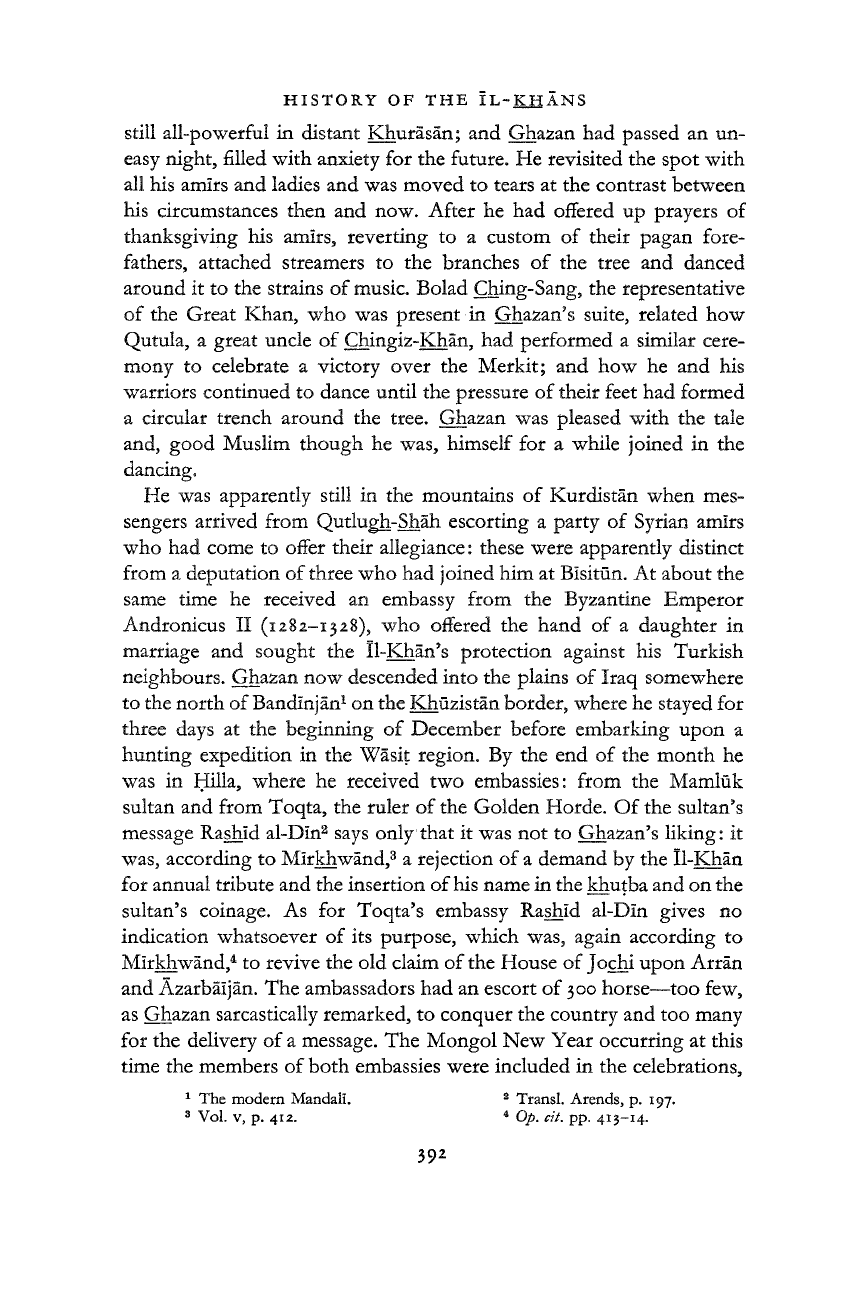
HISTORY OF THE IL-KJgANS
392
still all-powerful in distant Khurasan; and Ghazan had passed an un-
easy night, filled with anxiety for the future. He revisited the spot with
all his amirs and ladies and was moved to tears at the contrast between
his circumstances then and now. After he had offered up prayers of
thanksgiving his amirs, reverting to a custom of their pagan fore-
fathers, attached streamers to the branches of the tree and danced
around it to the strains of music. Bolad Ching-Sang, the representative
of the Great Khan, who was present in Ghazan's suite, related how
Qutula, a great uncle of Chingiz-Khan, had performed a similar cere-
mony to celebrate a victory over the Merkit; and how he and his
warriors continued to dance until the pressure of their feet had formed
a circular trench around the tree. Ghazan was pleased with the tale
and, good Muslim though he was, himself for a while joined in the
dancing.
He was apparently still in the mountains of Kurdistan when mes-
sengers arrived from Qutlugh-Shah escorting a party of Syrian amirs
who had come to offer their allegiance: these were apparently distinct
from a deputation of three who had joined him at Bisitun. At about the
same time he received an embassy from the Byzantine Emperor
Andronicus II
(1282-1328),
who offered the hand of a daughter in
marriage and sought the Il-Khan's protection against his Turkish
neighbours. Ghazan now descended into the plains of Iraq somewhere
to the north of Bandinjan
1
on the Kbuzistan border, where he stayed for
three days at the beginning of December before embarking upon a
hunting expedition in the Wasit region. By the end of the month he
was in Hilla, where he received two embassies: from the Mamluk
sultan and from Toqta, the ruler of the Golden Horde. Of the sultan's
message Rashid al-Din
2
says only that it was not to Ghazan's liking: it
was,
according to Mirkhwand,
3
a rejection of a demand by the Il-Khan
for annual tribute and the insertion of his name in the khutba and on the
sultan's coinage. As for Toqta's embassy Rashid al-Din gives no
indication whatsoever of its purpose, which was, again according to
Mirkhwand,
4
to revive the old claim of the House of Jochi upon Arran
and Azarbaijan. The ambassadors had an escort of
300
horse—too few,
as Ghazan sarcastically remarked, to conquer the country and too many
for the delivery of a message. The Mongol New Year occurring at this
time the members of both embassies were included in the celebrations,
1
The modern Mandali.
2
Transl. Arends, p. 197.
3
Vol. v, p. 412.
4
Op. at. pp. 413-14.
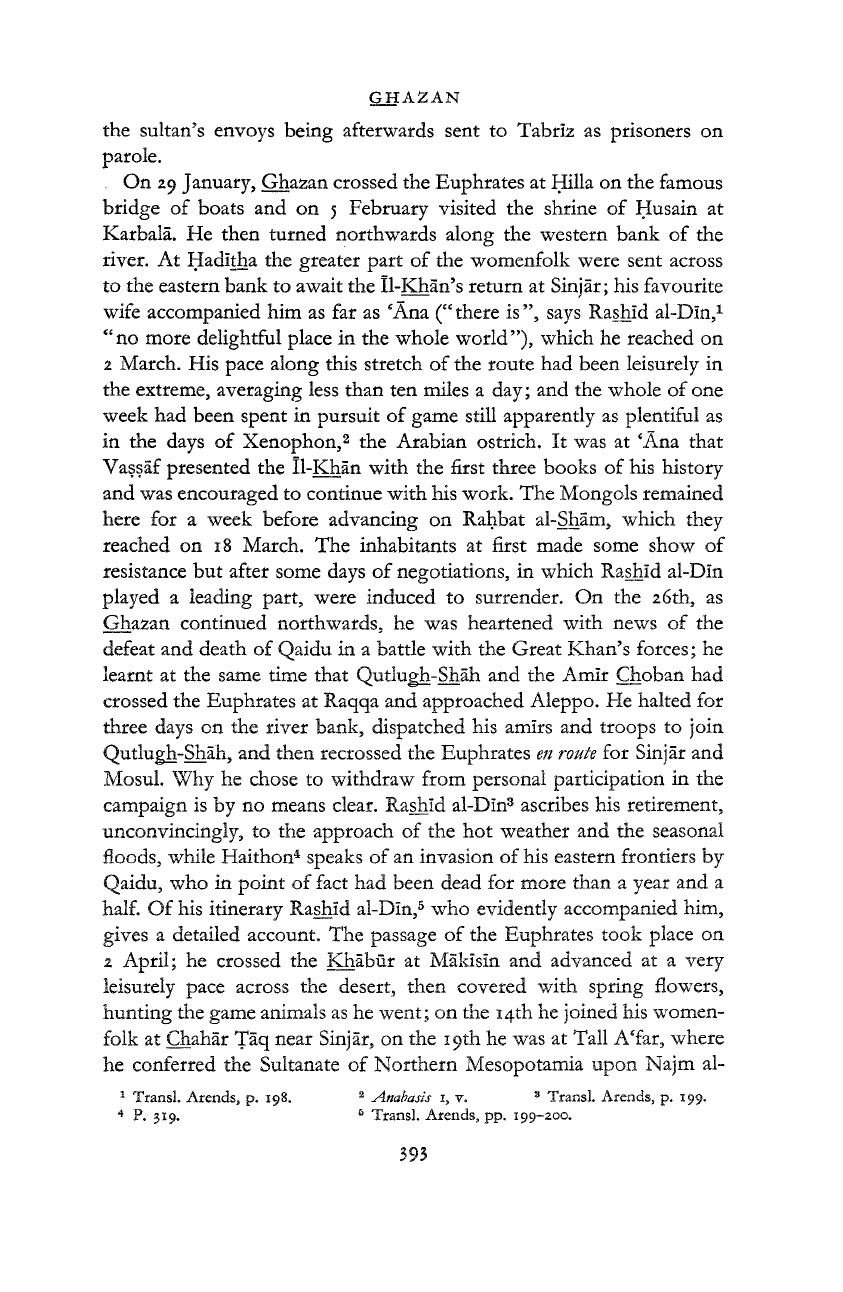
GHAZAN
393
the sultan's envoys being afterwards sent to Tabriz as prisoners on
parole.
On
29
January, Ghazan crossed the Euphrates at Hilla on the famous
bridge of boats and on 5 February visited the shrine of Husain at
Karbalâ. He then turned northwards along the western bank of the
river. At Hadiţha the greater part of the womenfolk were sent across
to the eastern bank to await the ll-Khăn's return at Sinjăr; his favourite
wife accompanied him as far as 'Ana (" there is ", says
Raşhid al-Din,
1
"no more delightful place in the whole world"), which he reached on
2
March. His pace along this stretch of the route had been leisurely in
the extreme, averaging less than ten miles a day; and the whole of one
week had been spent in pursuit of game still apparently as plentiful as
in the days of Xenophon,
2
the Arabian ostrich. It was at 'Ana that
Vaşşâf presented the Il-Khan with the first three books of his history
and was encouraged to continue with his work. The Mongols remained
here for a week before advancing on Rahbat
al-Shăm, which they
reached on 18 March. The inhabitants at first made some show of
resistance but after some days of negotiations, in which
Raşhid al-Din
played a leading part, were induced to surrender. On the 26th, as
Ghazan continued northwards, he was heartened with news of the
defeat and death of Qaidu in a battle with the Great Khan's forces; he
learnt at the same time that
Qutlugh-Shâh and the Amir Choban had
crossed the Euphrates at Raqqa and approached Aleppo. He halted for
three days on the river bank, dispatched his amirs and troops to join
Qutlugh-Şhăh, and then recrossed the Euphrates en route for Sinjăr and
Mosul. Why he chose to withdraw from personal participation in the
campaign is by no means clear. Raşhid al-Din
3
ascribes his retirement,
unconvincingly, to the approach of the hot weather and the seasonal
floods, while Haithon
4
speaks of an invasion of his eastern frontiers by
Qaidu, who in point of fact had been dead for more than a year and a
half.
Of his itinerary Raşhid al-Din,
5
who evidently accompanied him,
gives a detailed account. The passage of the Euphrates took place on
2
April; he crossed the Khăbur at Mâkisin and advanced at a very
leisurely pace across the desert, then covered with spring flowers,
hunting the game animals as he went; on the
14th
he joined his women-
folk at Chahăr Ţâq near Sinjăr, on the
19th
he was at Tall A'far, where
he conferred the Sultanate of Northern Mesopotamia upon Najm al-
1
Transl. Arends, p. 198.
2
Anabasis
1, v.
8
Transl. Arends, p. 199.
4
P. 319.
6
Transl. Arends, pp.
199-200.
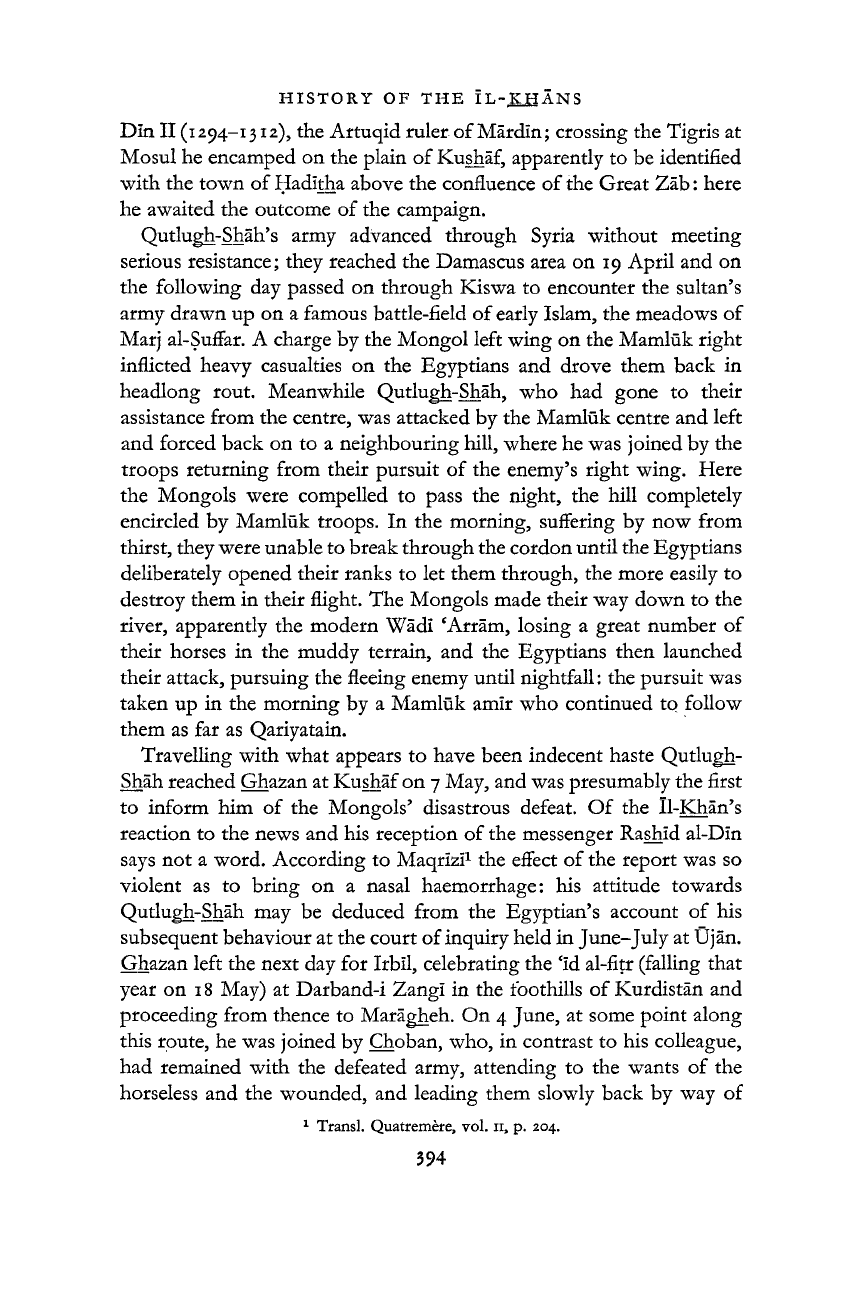
HISTORY OF THE IL - KHANS
394
Din II (i
294-1312),
the Artuqid ruler of Mardin; crossing the Tigris at
Mosul he encamped on the plain of Kushaf, apparently to be identified
with the town of Haditha above the confluence of the Great Zab: here
he awaited the outcome of the campaign.
Qutlugh-Shah's army advanced through Syria without meeting
serious resistance; they reached the Damascus area on 19 April and on
the following day passed on through Kiswa to encounter the sultan's
army drawn up on a famous battle-field of early Islam, the meadows of
Marj al-Suffar. A charge by the Mongol left wing on the Mamluk right
inflicted heavy casualties on the Egyptians and drove them back in
headlong rout. Meanwhile Qutlugh-Shah, who had gone to their
assistance from the centre, was attacked by the Mamluk centre and left
and forced back on to a neighbouring hill, where he was joined by the
troops returning from their pursuit of the enemy's right wing. Here
the Mongols were compelled to pass the night, the hill completely
encircled by Mamluk troops. In the morning, suffering by now from
thirst, they were unable to break through the cordon until the Egyptians
deliberately opened their ranks to let them through, the more easily to
destroy them in their flight. The Mongols made their way down to the
river, apparently the modern Wadi 'Arram, losing a great number of
their horses in the muddy terrain, and the Egyptians then launched
their attack, pursuing the fleeing enemy until nightfall: the pursuit was
taken up in the morning by a Mamluk amir who continued to follow
them as far as Qariyatain.
Travelling with what appears to have been indecent haste Qutlugh-
Shah reached Ghazan at Kushaf on 7 May, and was presumably the first
to inform him of the Mongols' disastrous defeat. Of the Il-Khan's
reaction to the news and his reception of the messenger Rashid al-Din
says not a word. According to Maqrizi
1
the effect of the report was so
violent as to bring on a nasal haemorrhage: his attitude towards
Qutlugh-Shah may be deduced from the Egyptian's account of his
subsequent behaviour at the court of inquiry held in June-July at Ujan.
Ghazan left the next day for Irbil, celebrating the 'id al-fitr (falling that
year on 18 May) at Darband-i Zangi in the foothills of Kurdistan and
proceeding from thence to Maragheh. On 4 June, at some point along
this route, he was joined by Choban, who, in contrast to his colleague,
had remained with the defeated army, attending to the wants of the
horseless and the wounded, and leading them slowly back by way of
1
Transl. Quatremere, vol. n, p. 204.
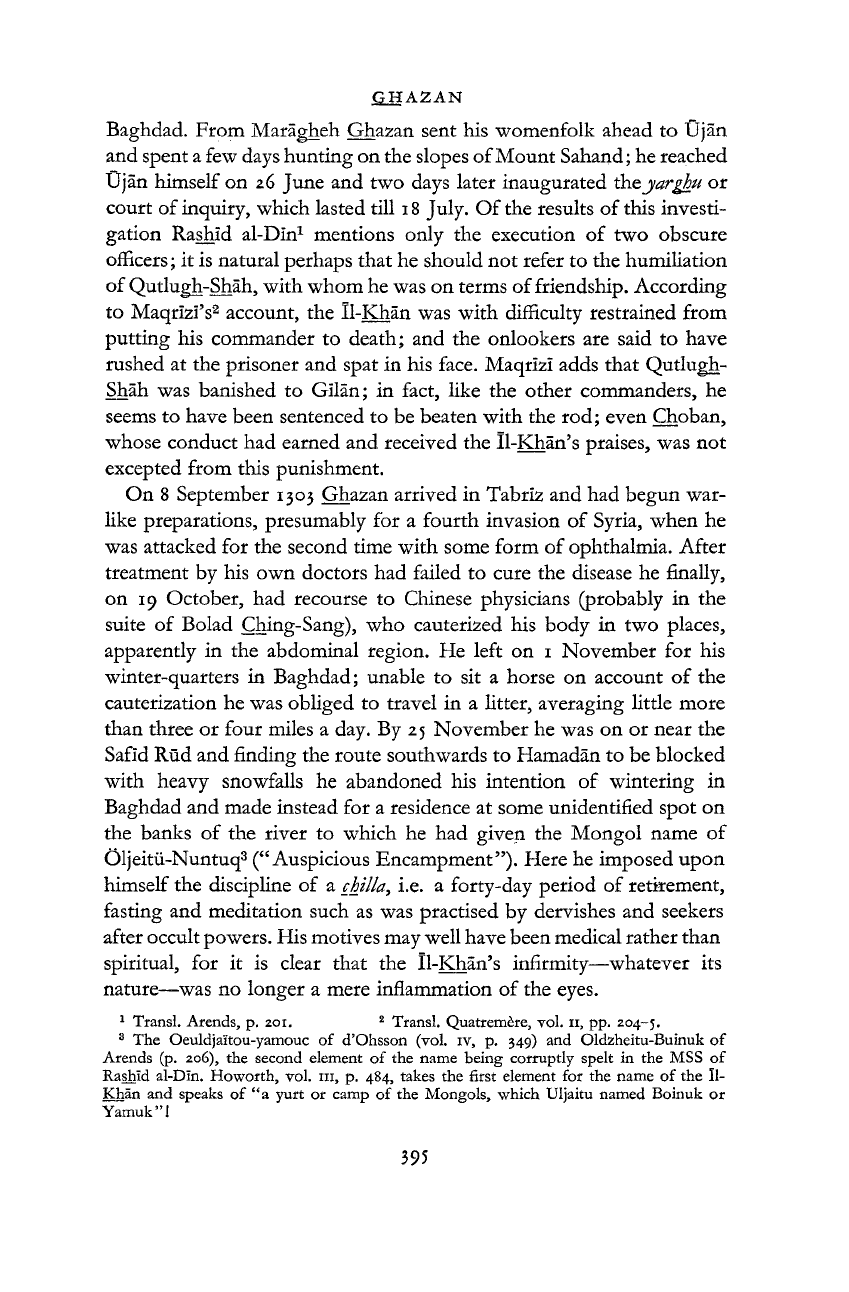
GHAZAN
395
Baghdad. From Maragheh Ghazan sent his womenfolk ahead to Ujan
and spent a few days hunting on the slopes of Mount Sahand; he reached
Ujan himself on 26 June and two days later inaugurated theyarghu or
court of inquiry, which lasted till 18 July. Of the results of this investi-
gation Rashid al-Din
1
mentions only the execution of two obscure
officers; it is natural perhaps that he should not refer to the humiliation
of Qutlugh-Shah, with whom he was on terms of friendship. According
to Maqrizi's
2
account, the Il-Khan was with difficulty restrained from
putting his commander to death; and the onlookers are said to have
rushed at the prisoner and spat in his face. Maqrizi adds that Qutlu
gh-
Shah was banished to Gilan; in fact, like the other commanders, he
seems to have been sentenced to be beaten with the rod; even Choban,
whose conduct had earned and received the Il-Khan's praises, was not
excepted from this punishment.
On 8 September
1303
Ghazan arrived in Tabriz and had begun war-
like preparations, presumably for a fourth invasion of Syria, when he
was attacked for the second time with some form of ophthalmia. After
treatment by his own doctors had failed to cure the disease he finally,
on 19 October, had recourse to Chinese physicians (probably in the
suite of Bolad Ching-Sang), who cauterized his body in two places,
apparently in the abdominal region. He left on 1 November for his
winter-quarters in Baghdad; unable to sit a horse on account of the
cauterization he was obliged to travel in a litter, averaging little more
than three or four miles a day. By 25 November he was on or near the
Safid Rud and finding the route southwards to Hamadan to be blocked
with heavy snowfalls he abandoned his intention of wintering in
Baghdad and made instead for a residence at some unidentified spot on
the banks of the river to which he had given the Mongol name of
Oljeitii-Nuntuq
3
("Auspicious Encampment"), Here he imposed upon
himself the discipline of a chilla, i.e. a forty-day period of retirement,
fasting and meditation such as was practised by dervishes and seekers
after occult powers. His motives may well have been medical rather than
spiritual, for it is clear that the Il-Khan's infirmity—whatever its
nature—was no longer a mere inflammation of the eyes.
1
Transl. Arends, p. 201.
2
Transl. Quatremere, vol. u, pp. 204-5.
3
The Oeuldjaitou-yamouc of d'Ohsson (vol. iv, p. 349) and Oldzheitu-Buinuk of
Arends (p. 206), the second element of the name being corruptly spelt in the MSS of
Rashid al-Din. Howorth, vol. in, p. 484, takes the first element for the name of the 11-
Khan and speaks of "a yurt or camp of the Mongols, which Uljaitu named Boinuk or
Yamuk"!
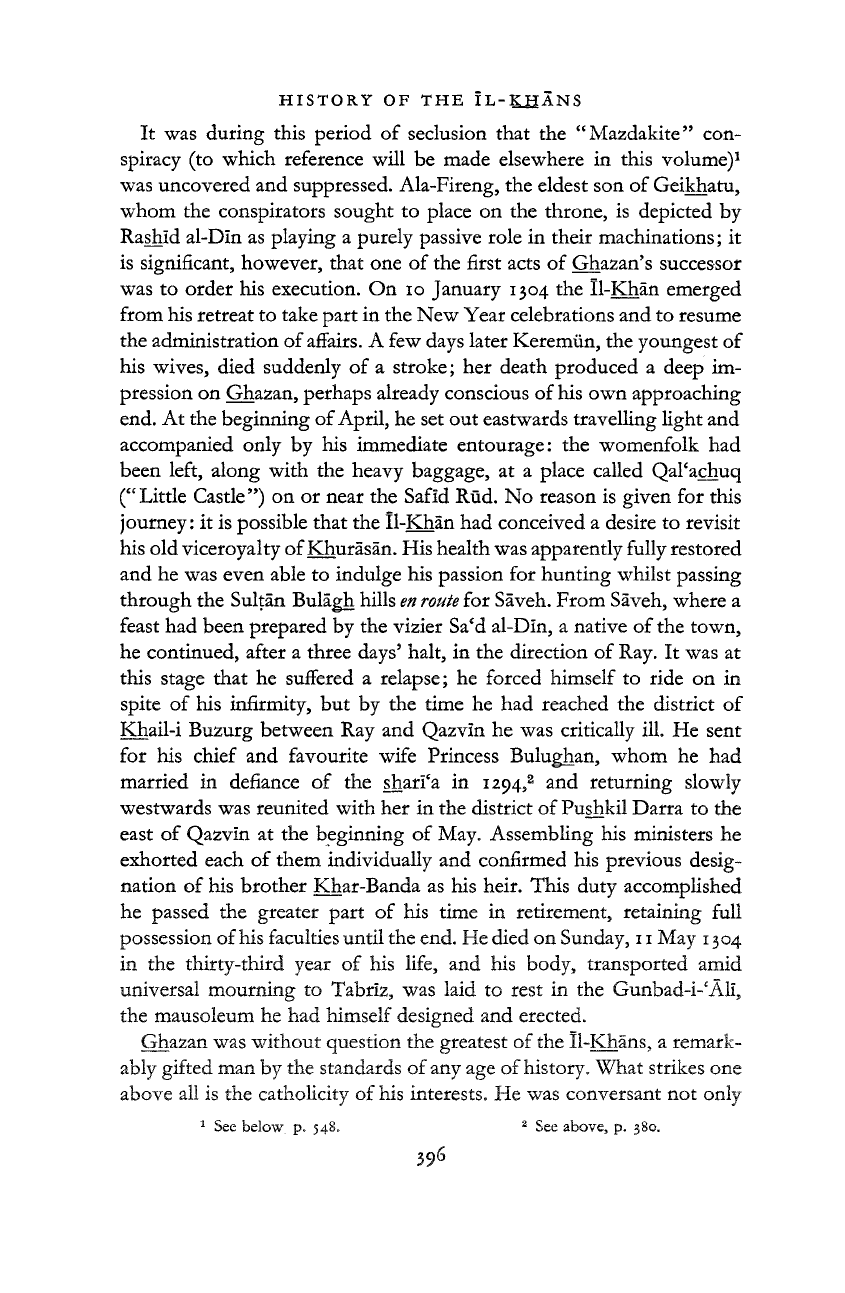
HISTORY OF THE IL-KHANS
396
It was during this period of seclusion that the "Mazdakite" con-
spiracy (to which reference will be made elsewhere in this volume)
1
was uncovered and suppressed. Ala-Fireng, the eldest son of Geikhatu,
whom the conspirators sought to place on the throne, is depicted by
Rashid al-Din as playing a purely passive role in their machinations; it
is significant, however, that one of the first acts of Ghazan's successor
was to order his execution. On 10 January
1304
the Il-Khan emerged
from his retreat to take part in the New Year celebrations and to resume
the administration of affairs. A few days later Keremiin, the youngest of
his wives, died suddenly of a stroke; her death produced a deep im-
pression on Ghazan, perhaps already conscious of his own approaching
end. At the beginning of April, he set out eastwards travelling light and
accompanied only by his immediate entourage: the womenfolk had
been left, along with the heavy baggage, at a place called Qal'achuq
("Little Castle") on or near the Safid Rud. No reason is given for this
journey: it is possible that the Il-Khan had conceived a desire to revisit
his old viceroyalty of Khurasan. His health was apparently fully restored
and he was even able to indulge his passion for hunting whilst passing
through the Sultan Bulagh hills
en route
for Saveh. From Saveh, where a
feast had been prepared by the vizier Sa'd al-Din, a native of the town,
he continued, after a three days' halt, in the direction of Ray. It was at
this stage that he suffered a relapse; he forced himself to ride on in
spite of his infirmity, but by the time he had reached the district of
Khail-i Buzurg between Ray and Qazvin he was critically ill. He sent
for his chief and favourite wife Princess Bulughan, whom he had
married in defiance of the shari'a in
1294,2
and returning slowly
westwards was reunited with her in the district of Pushkil Darra to the
east of Qazvin at the beginning of May. Assembling his ministers he
exhorted each of them individually and confirmed his previous desig-
nation of his brother Khar-Banda as his heir. This duty accomplished
he passed the greater part of his time in retirement, retaining full
possession of his faculties until the end. He died on Sunday, 11 May
1304
in the thirty-third year of his life, and his body, transported amid
universal mourning to Tabriz, was laid to rest in the Gunbad-i-'AIi,
the mausoleum he had himself designed and erected.
Ghazan was without question the greatest of the Il-Khans, a remark-
ably gifted man by the standards of any age of history.
What
strikes one
above all is the catholicity of his interests. He was conversant not only
1
See
below p. 548.
2
See above, p. 380.
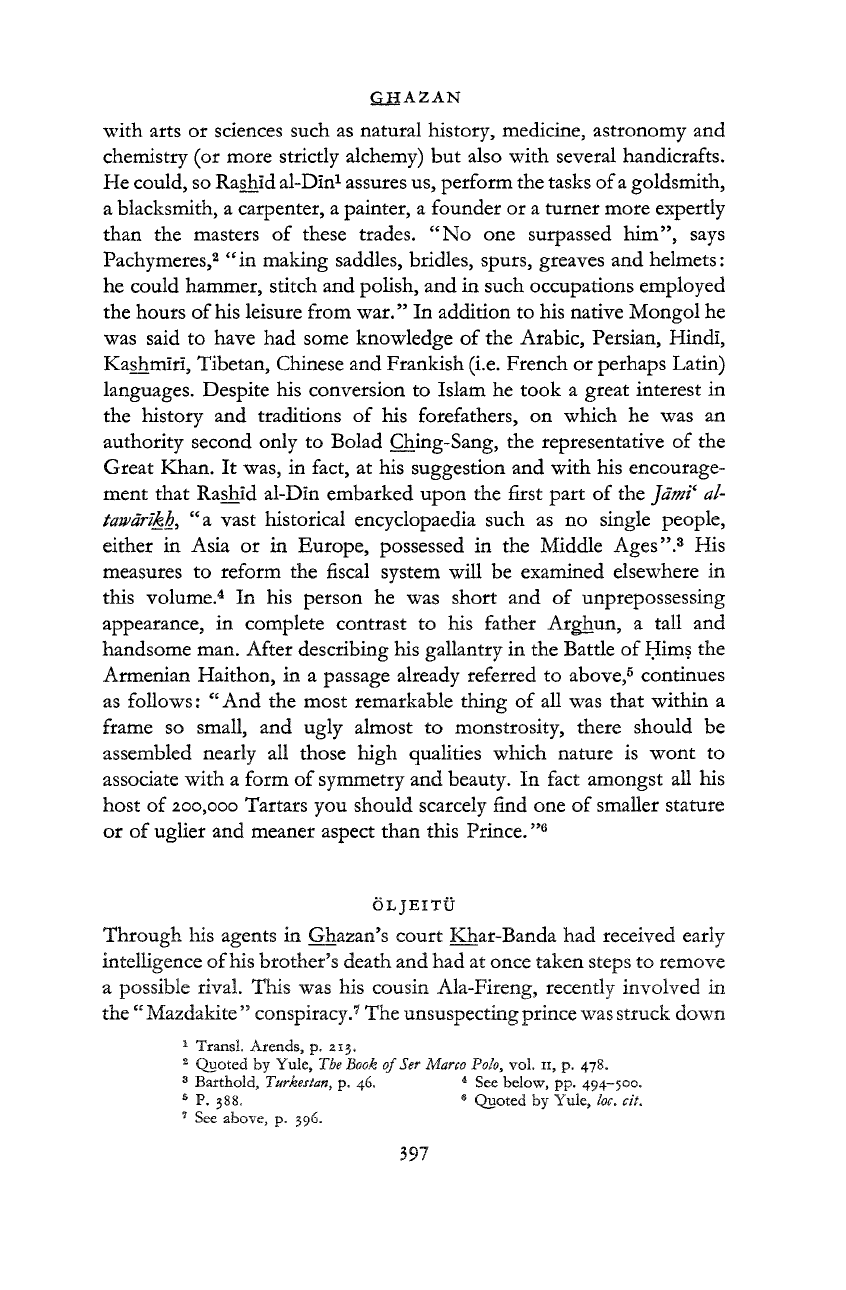
QHAZAN
397
with arts or sciences such as natural history, medicine, astronomy and
chemistry (or more strictly alchemy) but also with several handicrafts.
He could, so Rashid al-Din
1
assures us, perform the tasks of a goldsmith,
a blacksmith, a carpenter, a painter, a founder or a turner more expertly
than the masters of these trades. "No one surpassed him", says
Pachymeres,
2
" in making saddles, bridles, spurs, greaves and helmets:
he could hammer, stitch and polish, and in such occupations employed
the hours of his leisure from war." In addition to his native Mongol he
was said to have had some knowledge of the Arabic, Persian, Hindi,
Kashmiri, Tibetan, Chinese and Frankish (i.e. French or perhaps Latin)
languages. Despite his conversion to Islam he took a great interest in
the history and traditions of his forefathers, on which he was an
authority second only to Bolad Ching-Sang, the representative of the
Great Khan. It was, in fact, at his suggestion and with his encourage-
ment that Rashid al-Din embarked upon the first part of the Jdmf al-
tawdrlkh, "a vast historical encyclopaedia such as no single people,
either in Asia or in Europe, possessed in the Middle Ages".
3
His
measures to reform the fiscal system will be examined elsewhere in
this volume.
4
In his person he was short and of unprepossessing
appearance, in complete contrast to his father Arghun, a tall and
handsome man. After describing his gallantry in the Battle of Hims the
Armenian Haithon, in a passage already referred to above,
5
continues
as follows: "And the most remarkable thing of all was that within a
frame so small, and ugly almost to monstrosity, there should be
assembled nearly all those high qualities which nature is wont to
associate with a form of symmetry and beauty. In fact amongst all his
host of 200,000 Tartars you should scarcely find one of smaller stature
or of uglier and meaner aspect than this Prince. "
6
OLJEITU
Through his agents in Ghazan's court Khar-Banda had received early
intelligence of his brother's death and had at once taken steps to remove
a possible rival. This was his cousin Ala-Fireng, recently involved in
the " Mazdakite " conspiracy.
7
The unsuspecting prince was struck down
1
Transl. Arends, p. 213.
2
Quoted by Yule, The Book of Ser Marco Polo, vol. 11, p. 478.
3
Barthold, Turkestan, p. 46.
4
See below, pp. 494-500.
5
P. 388.
6
Quoted by Yule, loc. cit.
7
See above, p. 396.
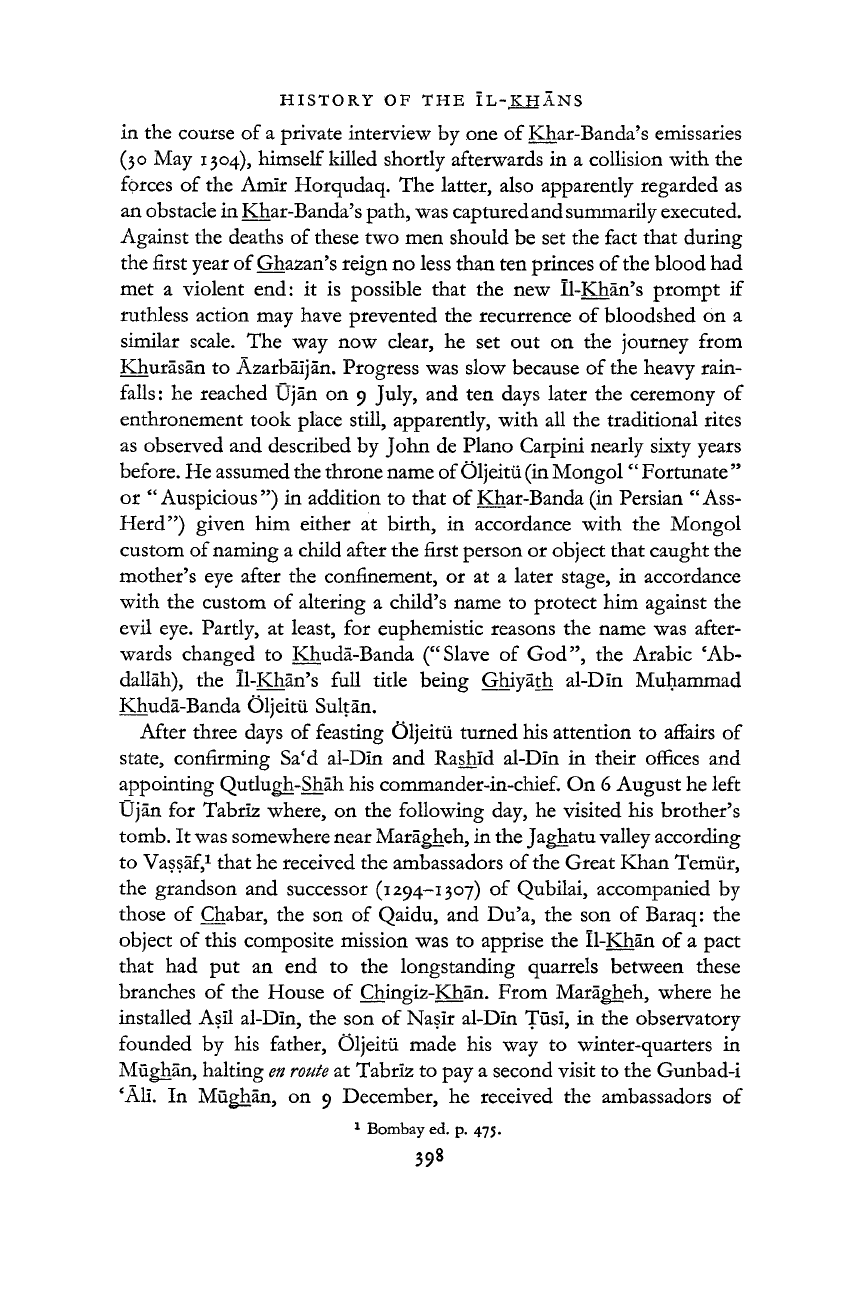
HISTORY OF THE IL-KHÂNS
in the course of a private interview by one of Khar-Banda's emissaries
(30 May 1304), himself killed shortly afterwards in a collision with the
forces of the Amir Horqudaq. The latter, also apparently regarded as
an obstacle in Khar-Banda's path, was captured and summarily executed.
Against the deaths of these two men should be set the fact that during
the first year of Ghazan's reign no less than ten princes of the blood had
met a violent end: it is possible that the new Il-Khan's prompt if
ruthless action may have prevented the recurrence of bloodshed on a
similar scale. The way now clear, he set out on the journey from
Khurasan to Âzarbâijân. Progress was slow because of the heavy rain-
falls: he reached Üjân on 9 July, and ten days later the ceremony of
enthronement took place still, apparently, with all the traditional rites
as observed and described by John de Piano Carpini nearly sixty years
before.
He assumed the throne name of Öljeitü (in Mongol " Fortunate"
or "Auspicious") in addition to that of Khar-Banda (in Persian "Ass-
Herd") given him either at birth, in accordance with the Mongol
custom of naming a child after the first person or object that caught the
mother's eye after the confinement, or at a later stage, in accordance
with the custom of altering a child's name to protect him against the
evil eye. Partly, at least, for euphemistic reasons the name was after-
wards changed to Khudâ-Banda ("Slave of God", the Arabic 'Ab-
dalları),
the Il-Khân's full title being Ghiyâth al-Din Muhammad
Khudâ-Banda Öljeitü Sultan.
After three days of feasting Öljeitü turned his attention to affairs of
state,
confirming Sa'd al-Din and Rashid al-Din in their offices and
appointing Qutlugh-Shah his commander-in-chief. On 6 August he left
Üjân for Tabriz where, on the following day, he visited his brother's
tomb. It was somewhere near Marâgheh, in the Jaghatu valley according
to
Vaşşâf,
1
that he received the ambassadors of the Great Khan Temür,
the grandson and successor
(1294-1307)
of Qubilai, accompanied by
those of Chabar, the son of Qaidu, and Du'a, the son of Baraq: the
object of this composite mission was to apprise the Il-Khan of a pact
that had put an end to the longstanding quarrels between these
branches of the House of Chingiz-Khân. From Marâgheh, where he
installed Aşil al-Din, the son of Naşir al-Din Tusi, in the observatory
founded by his father, Öljeitü made his way to winter-quarters in
Müghân, halting
en
route at Tabriz to pay a second visit to the Gunbad-i
'Âli.
In Müghân, on 9 December, he received the ambassadors of
1
Bombay ed. p. 475.
398
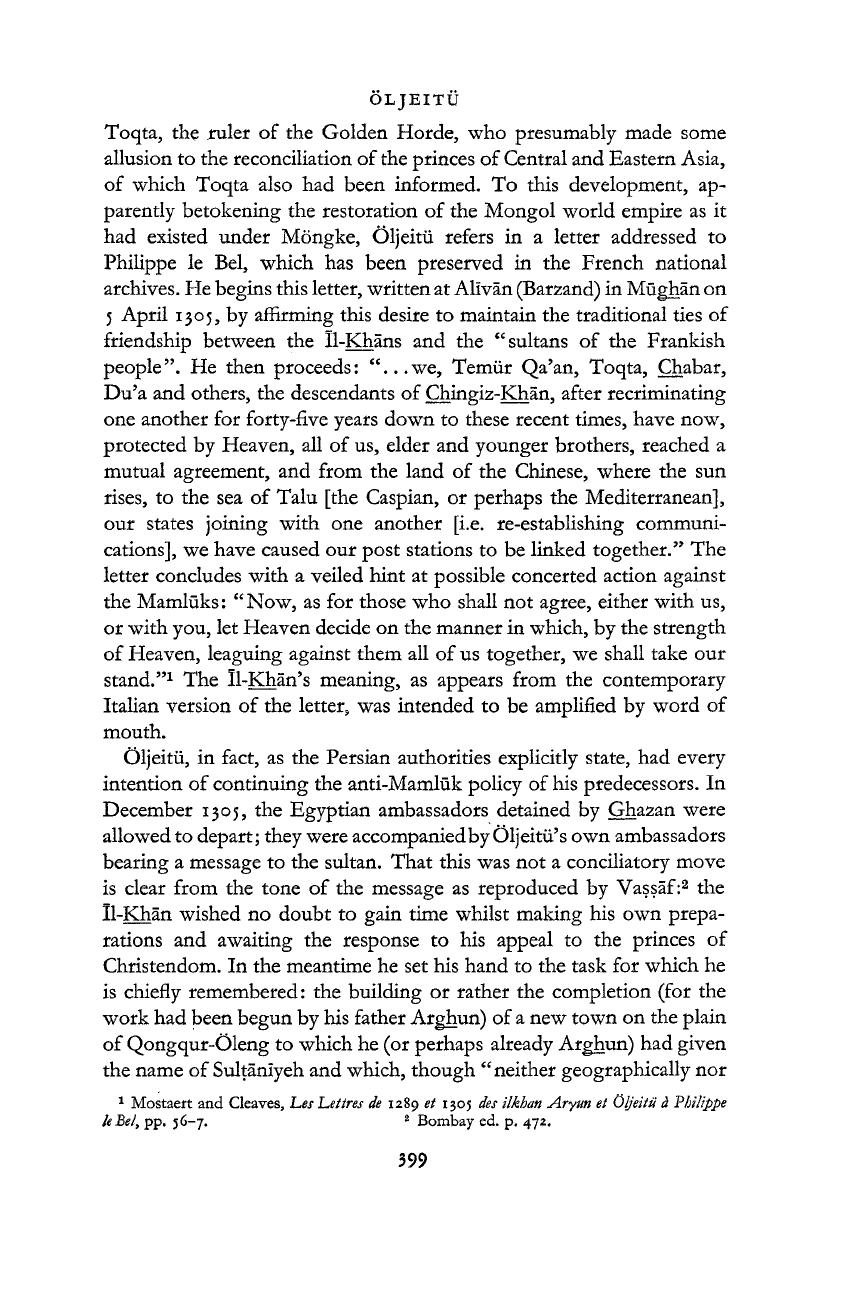
OLJEITU
399
Toqta, the ruler of the Golden Horde, who presumably made some
allusion to the reconciliation of the princes of Central and Eastern Asia,
of which Toqta also had been informed. To this development, ap-
parently betokening the restoration of the Mongol world empire as it
had existed under Mongke, Oljeitu refers in a letter addressed to
Philippe le Bel, which has been preserved in the French national
archives. He begins this letter, written at Ativan (Barzand) in Mu
ghan on
5
April
1305,
by affirming this desire to maintain the traditional ties of
friendship between the Il-Khans and the "sultans of the Frankish
people". He then proceeds: "...we, Temur Qa'an, Toqta, Chabar,
Du'a and others, the descendants of Chingiz-Khan, after recriminating
one another for forty-five years down to these recent times, have now,
protected by Heaven, all of us, elder and younger brothers, reached a
mutual agreement, and from the land of the Chinese, where the sun
rises, to the sea of Talu [the Caspian, or perhaps the Mediterranean],
our states joining with one another [i.e. re-establishing communi-
cations],
we have caused our post stations to be linked together." The
letter concludes with a veiled hint at possible concerted action against
the Mamluks: " Now, as for those who shall not agree, either with us,
or with you, let Heaven decide on the manner in which, by the strength
of Heaven, leaguing against them all of us together, we shall take our
stand."
1
The Il-Khan's meaning, as appears from the contemporary
Italian version of the letter^ was intended to be amplified by word of
mouth.
Oljeitu, in fact, as the Persian authorities explicitly state, had every
intention of continuing the anti-Mamluk policy of his predecessors. In
December
1305,
the Egyptian ambassadors detained by Ghazan were
allowed to depart; they were accompanied by Oljeitu's own ambassadors
bearing a message to the sultan. That this was not a conciliatory move
is clear from the tone of the message as reproduced by
Vassaf:
2
the
Il-Khan wished no doubt to gain time whilst making his own prepa-
rations and awaiting the response to his appeal to the princes of
Christendom. In the meantime he set his hand to the task for which he
is chiefly remembered: the building or rather the completion (for the
work had been begun by his father Arghun) of a new town on the plain
of Qongqur-Oleng to which he (or perhaps already Arghun) had given
the name of Sultaniyeh and which, though "neither geographically nor
1
Mostaert and Cleaves, Les Lettres de 1289 et 1305 des ilkhan Aryun et Oljeitu
0՝
Philippe
jeBel, pp. 56-7.
2
Bombay ed. p. 472.
